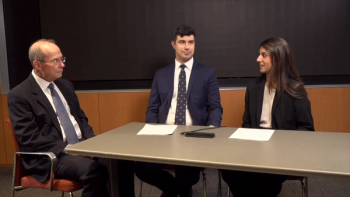
Importance of Adherence in Treatment of Open-Angle Glaucoma
Transcript:
Joseph F. Panarelli, MD: What advice, if any, is there to offset open-angle glaucoma beyond lifestyle changes?
Sahar Bedrood, MD, PhD: This is a question I get every single day from my patients. There is no hard evidence that shows a lifestyle change is going to change your rate of glaucoma progression. We do, however, I, propose an active healthy lifestyle.
There’s a study by Ramulu et al that showed patients with advanced open-angle glaucoma who exercised before visual field, they actually did better on their visual field than someone who didn’t exercise. And so in general when patients ask me this question I do say, “You know, there’s no real hard evidence, but I always promote exercise and healthy eating.”
Dr. Panarelli: Patient adherence and/or compliance is a recognized issue with topical medications, especially as patients require more than one medication. How do you address the importance of adherence?
Dr. Bedrood: I have open, frank conversations with my patients. I ask them how they’re doing on the medication, if they’re using it. I tell them the importance of being able to tell me if they’re not using it because if they’re not, then they might be headed towards surgery. Usually when I say the word surgery, they tell me the truth. Compliance is a real issue. Not just the, “Are you using it,” but, “Are you able to open the cap? Are you putting into the eye properly?” So oftentimes we’ll ask the patient to demonstrate for me how they do that. They open it up and they’ll put it into their eye. And it oftentimes takes a very long time for them, or they’re not doing it properly. So those are things that I kind of go through in my clinic visit with them.
Dr. Panarelli: Do you ever engage the family members?
Dr. Bedrood: I find that engaging with the family members is really beneficial. Oftentimes it’s a caregiver giving a drop, or a nurse in a nursing home. They may or may not be there. But if a family member is present, I usually like to ask them, “Who’s giving the drop, and how often?” And it places kind of an onus of responsibility on whoever is in the room to help with this whole regimen.
Dr. Panarelli: I feel like that’s been my secret. I either engage the patient’s wife or the patient’s child and I really make it their responsibility. And I ask them every time they come in. I turn to them first. I say, “How is so and so doing with their medication?” It’s helpful when you actually try to bring some of the other family members in so they can better understand why this is so important, and I think they help reinforce it when we’re not there.
What are your thoughts on the fact that patients will often take medicines for their diabetes, for their hypertension, but they really don’t use their glaucoma medicines quite as often?
Dr. Bedrood: I think there are a number of issues that patients face. When they’re glaucoma patients, they physically have to open up the bottles and place it in their eyes every single day. That act is very different than taking a pill, and it’s oftentimes more difficult for patients. So simply the logistics of doing it can change. Cost is always a deterrent for patients. Eye drops can be far more costly than some of the generic medications for other things. And then lastly, I think because of the nature of glaucoma being so asymptomatic, patients are less aware of their disease and less likely to start the medications or use them because they think, “Oh, I’m fine, I’m not feeling anything, I’m not seeing any differently and I’ll skip my dose today.” Whereas, when someone has a symptomatic issue like congestive heart failure or diabetes, they are more apt to using their medications - hopefully - because they’re a little more symptomatic and they remember that something is wrong with them.
Dr. Panarelli: I think that’s very true. I have many patients who skip a lot of their appointments and oftentimes I ask them and they say, “Well, I figured if I come once every 6 months it’s probably okay.” Some of the patients who were going for their intravitreal injections are more likely to actually go to those appointment because they know that they need those injections to see better. So we talk about glaucoma being a silent thief. That is a big problem for our patients is they don’t physically see the need often to come to these appointments, or they don’t see the need to take their drops quite like some other conditions that are possibly affecting them.
How do you address adherence/compliance issues if and when patients complain about medication costs?
Dr. Bedrood: I always have tried to have really frank conversations with my patients. I ask them, of course, how’s it going. I actually ask them is this covered by your insurance, how’s the cost, is it working for you? A lot of times patients will have a hard time with the cost of the non-generic and sometimes even with the generic medications, patients can’t afford them. We really try to address that. I have a whole team of people that try to fill out the prior authorizations. I get patients coupons and programs, into special pharmacies that can get patients better rates for their glaucoma medications. These things are all pretty time consuming throughout my day, to be quite frank with you, as they are for all of the ophthalmologists in the nation. And so something really needs to kind of change on that landscape at some point. But we discuss it and we try our best to basically get these patients back on track, whether it’s from a cost standpoint or a logistical standpoint of how they’re getting the drugs.
Dr. Panarelli: Do you think this might, in the future, make you more likely to move toward using a medicine like bimatoprost SR?
Dr. Bedrood: Absolutely. Something like a sustained release drug that allows the patient to not have to pay for their drugs every month or take them on a daily basis is really beneficial for the patient. And, quite frankly, it also reduces the burden on the surface of the eye because these drugs can be toxic. They can be allergic to the preservatives or the chemical of the drug, and being able to be off the topical drops in general is really kind of remarkable. So I think in all senses, it’s going to be win-win-win for the patient. They will reduce their cost, reduce the burden of having to put a drop in, and reduce the burden on their ocular surface as well.
Dr. Panarelli: I think it will be an interesting question for doctors whose offices are bogged down with a lot of these phone calls trying to get prior authorizations, trying to get good medicines into our patients’ hands. And , if we have an alternative to that, I think we would be happy to use it if it is as safe and efficacious as some of the studies have shown it to be.
Newsletter
Don’t miss out—get Ophthalmology Times updates on the latest clinical advancements and expert interviews, straight to your inbox.





























